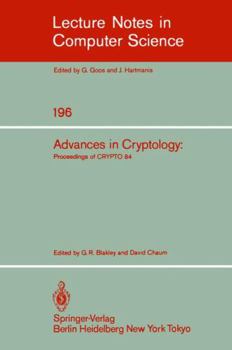Advances in Cryptology: Proceedings of Crypto '84
Recently, there has been a lot of interest in provably "good" pseudo-random number generators [lo, 4, 14, 31. These cryptographically secure generators are "good" in the sense that they pass all probabilistic polynomial time statistical tests. However, despite these nice properties, the secure generators known so far suffer from the han- cap of being inefiicient; the most efiicient of these take n2 steps (one modular multip- cation, n being the length...
Format:Paperback
Language:English
ISBN:3540156585
ISBN13:9783540156581
Release Date:July 1985
Publisher:Springer
Length:496 Pages
Weight:1.55 lbs.
Dimensions:1.0" x 6.1" x 9.2"
Customer Reviews
0 rating





